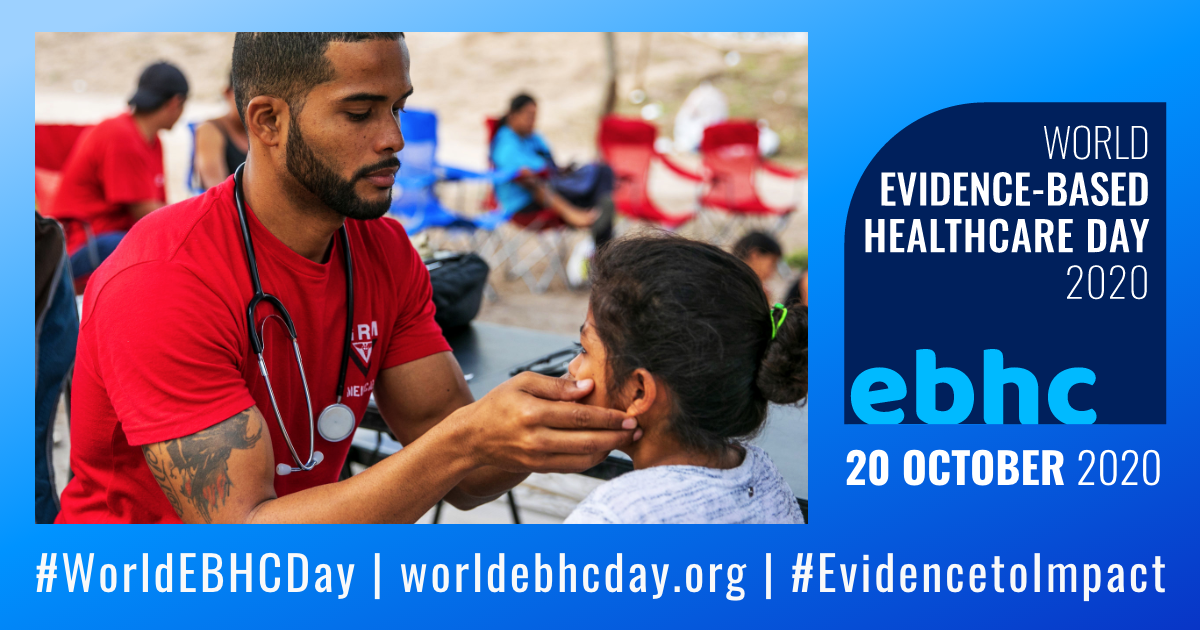COVID-19 shines global spotlight on evidence-based healthcare

The global COVID-19 pandemic has highlighted more than ever the need for the best available evidence to inform healthcare policy, practice and decision-making in order to improve health outcomes globally.
Seven of the world’s leading groups in evidence-based healthcare – including the University of Adelaide’s JBI – are launching the inaugural World Evidence-Based Healthcare (EBHC) Day, to be held on 20 October 2020.
The worldwide initiative is aimed at creating awareness of the critical need to advance the use of reliable research evidence that is relevant, actionable and adaptable to address some of the world’s most serious health challenges.
“The COVID-19 pandemic is a prime example of how misinformation can spread rapidly around the world, and this has a real impact on people’s lives and the community more widely,” says Bianca Pilla, Global Relations Manager with JBI at the University of Adelaide and Chair of World Evidence-Based Healthcare Day.
“Many people will also not realise that in clinical research, there is a 17-year research-to-practice gap of implementing clinical research evidence into practice. We need to find ways of reducing that gap, so that the best available research evidence can be used to address some of the world’s most serious health challenges, and improve patient care sooner.
“World Evidence-Based Healthcare Day is an opportunity for collaboration in the ever-evolving sphere of global health. It will provide a platform to discuss and debate the challenges and innovations in improving health outcomes globally, based on evidence-informed approaches to healthcare,” Ms Pilla says.
“The COVID-19 pandemic is a prime example of how misinformation can spread rapidly around the world, and this has a real impact on people’s lives and the community more widely.”Bianca Pilla
In 2020, evidence-based healthcare (EBHC) is a worldwide movement with hundreds of organisations and tens of thousands of individuals working tirelessly towards improving the science and practice of EBHC for the same aim: to improve health outcomes.
“The need and demand for EBHC continues to grow rapidly due to increased availability of digital information, better informed patients, introduction of new technologies, increased healthcare costs, complex adaptive health systems and ageing populations,” Ms Pilla says.
“In 2020, the importance of having the ability to utilise the best available evidence has been highlighted by the rapid implementation of effective hand washing and the correct use of PPE to help fight the spread of COVID-19.
“Around the world, scientists are working together to develop vaccines, researchers have identified and shared hundreds of viral genome sequences, more than 200 clinical trials have been launched, and international evidence synthesis organisations are rapidly synthesising the emerging evidence to assist policymakers in making informed decisions.”
Professor Zoe Jordan, JBI Executive Director, says: “Globally, healthcare environments are changing rapidly, which leads to a need for guidance to practice high-quality, effective care.
“Now, more than ever, we see the value and the necessity of having access to the best available research evidence. Not only for what is effective, but what is feasible or appropriate in different clinical or geographical settings” Professor Jordan says.
About World Evidence-Based Healthcare Day 2020
World Evidence-Based Healthcare (EBHC) Day will be held on 20 October each year, starting in 2020. It is a global initiative that raises awareness of the need for better evidence to inform healthcare policy, practice and decision making in order to improve health outcomes globally. It is an opportunity to participate in debate about global trends and challenges, but also to celebrate the impact of individuals and organisations worldwide, recognising the work of dedicated researchers, policymakers and health professionals in improving health outcomes.
The theme for World EBHC Day 2020 is From Evidence to Impact, with a call to individuals and organisations worldwide to share their experiences of how their work in EBHC has contributed to impact in health research, policy, practice, guidelines or patient outcomes.
For more information, please visit: https://worldebhcday.org
About JBI
JBI is an international research organisation based at the University of Adelaide, South Australia. JBI develops and delivers unique evidence-based information, software, education and training designed to improve healthcare practice and health outcomes globally. For 25 years JBI has worked with its global network of 75+ universities and hospitals across 40+ countries to ensure that researchers, policymakers and health professionals can access high quality evidence, appraise diverse types of evidence and apply evidence at the point of care.
Bianca Pilla, World Evidence-Based Healthcare (EBHC) Day committee Chair
Global Relations Manager, JBI, The University of Adelaide
Mobile: +61 (0)404 893 324, bianca.pilla@adelaide.edu.au
Elisa Black, Manager – News and Media, The University of Adelaide
Mobile: +61 (0)466 460 959, elisa.black@adelaide.edu.au
